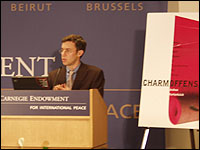IMGXYZ707IMGZYXOn June 4, 2007, the Carnegie Endowment for International Peace hosted an event entitled “Charm Offensive: How China’s Soft Power is Transforming the World.” Visiting Scholar Joshua Kurlantzick discussed his new book by the same title. Carnegie Senior Associate Alberit Keidel moderated the event.
The purpose of Kurlantzick’s book is to provide reportage on China’s public appeal, describe the tools of soft power, and analyze its degree of success. He began by describing the development of China’s soft power; the popularity of China’s response to the Asian Financial Crisis caused Chinese leaders to realize the benefits of soft power. In the late 1990s, one can begin to see a more coherent Chinese soft policy toward Southeast Asia.
In addition, the book explores the tools that China uses to promote its soft power. China is the biggest aid donor in the Philippines, Laos and Cambodia. In the past, the aid was spent predominantly on infrastructure and big prestige projects. Now, much of the aid is going to more public diplomacy programs, like educational and cultural programs overseas. China has set up the Confucius Institute Project which helps to fund Chinese language program overseas and provides scholarship to students to go to China to study. These actions are also supported by more skilled formal diplomacy. For example, the Chinese ambassador now appears on a nightly television show in Thailand while a few years ago he was basically invisible.
In short, China’s policy is very pragmatic and ideology has a very limited role. Chinese diplomats are also engaging more with the media which begs the question of whether they will engage more with other organizations, such as NGOs, in the future. China has also built a greater appeal by working through multilateral organizations. Chinese companies look for places with greater risk and where competition with other foreign companies is limited. However, to what extent China has a model of development and whether it could actually be applied elsewhere is still a remaining question.
Furthermore, in areas where there are large Chinese communities in Southeast Asia, China is reaching out to leverage these communities to encourage them to support China, for example, in its Taiwan policy.
There are various indicators of success. In Southeast Asia, China has been signing TIFAs which are sector-by-sector trade agreements which increases their role in the region, decreasing that of Japan. In the media in this region, Xinhua is picked up by newspapers along with Reuters and AP, even though it is not an independent newswire.
Polls in Southeast Asia and Africa show that the people view China as a positive actor and the media predominantly portrays China in a positive light. Interestingly, as relations with China warmed, these countries have improved their domestic relations with ethnic Chinese populations.
This does not mean that countries have no fear of China, but that China has been working hard to assuage their fears. And the reactions vary throughout the region. Vietnam still has a contentious relationship with China, while Singapore is engaging in hedging. In general, governments feel much less limited in their relations with China because their publics promote good relations. The public appeal has therefore allowed for greater economic and military cooperation because public officials are not worried about backlash. This has allowed China to play the role of a regional mediator to some degree.
Three critical questions, however, still remain: As China becomes more influential, will it work with other powers or will it work to divide other powers? Will China understand popular politics (civil society) abroad or will it fail to work with these variables, sparking protests against it? Does China really have a model of development that challenges the Washington Consensus or is it just practicing pragmatic diplomacy? If it does have a coherent model, how much is non-intervention a core ideal of this ideology? If the Chinese move away from non-intervention, will it hurt the appeal of their model?
In the Q&A period, Josh discussed how China has benefited from U.S. policy failures, though he comments that it was not deliberate in the sense that China has not been actively undermining U.S. policy. Furthermore, China’s popularity has increased as well in countries which still support the United States, which suggests that increased Chinese popularity is due to Chinese policy, not U.S. policy failures. China has also played on the broader unpopularity of the World Bank, IMF, and Western powers; China is sensitive to criticism from these groups and responds that prior policies in, for example, Africa, have not worked.
Kurlantzick also commented on India’s role in Southeast Asia. China has a much more substantial and longer relationship with countries in the region. The better India’s relationship with the United States, the more constraints they will have on their methods of diplomacy and the countries with which they engage. Under these circumstances, it is difficult to compete with China for influence and energy resources.
Kurlantzick comments that China has also recognized that taking a softer approach to Taiwan has been a more effective policy in terms of China-Taiwan relations, and China-Southeast Asian relations. In terms of the durability of Chinese soft power, Chinese pop culture has not taken center stage yet, partially because many Chinese artists are restricted in their work in China and are not really allowed to be a part of the soft power initiative, which is seen as state directed.
The last question asked for what will China use its soft power. Kurlantzick replied that China uses this power to protect its interests in the region and at home such as pushing for more substantial energy cooperation, repatriation of Uighurs, prestige, support for their Taiwan policy, and many other issues which China sees as important.
